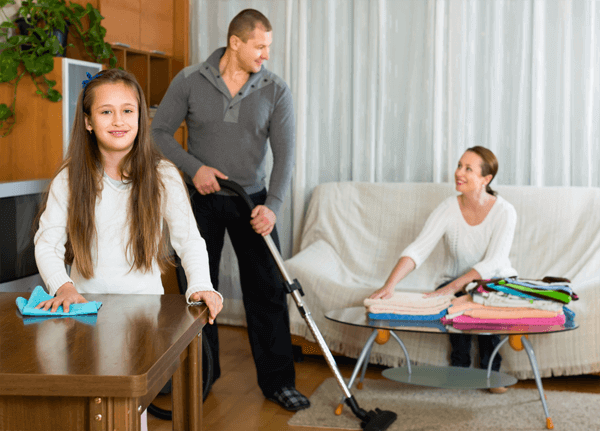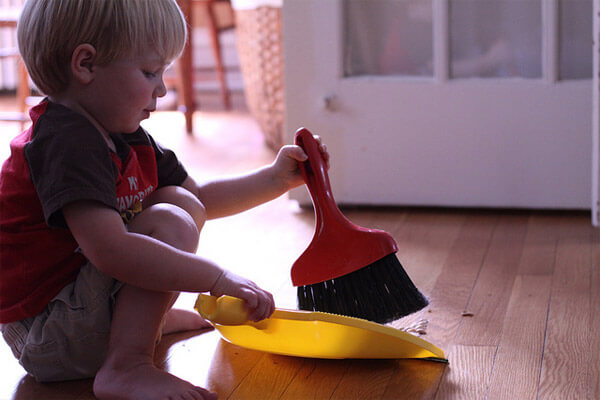Teaching Your Children to Help With Household Chores

Surely you’ve heard that it’s good for your children to help out around the house. It’s true! We’ll tell you why and explain how to introduce them to household chores.
Helping out around the house is the beginning of a fundamental lesson for your children: the ability to be independent. Something as routine and basic as being responsible for certain tasks can make your children grow up safe, independent and capable of achieving their goals.
Experts recognize that it’s very beneficial for children to help at home with tasks that are adapted to their ages and abilities.
Benefits of helping with household chores
There are many advantages to letting your children help with small tasks around the house.
- Promote self-esteem. Knowing that they’re capable of doing housework will give them a feeling of satisfaction and boost their self-esteem.
- Encourage independence. Being autonomous must be one of the goals of educating children. Raising children who are capable of facing the difficulties of life without depending on anyone other than themselves is a priority.

- Teach responsibility. Responsibility is the capacity to face what is put in front of us without delegating, fleeing or abandoning it.
- Promotes teamwork. Children will learn to work in a team, to collaborate. Knowing how to manage tasks as a team is beneficial for them. Together you can do more and better things.
- Favors order and hygiene. Knowing that it’s necessary to have an orderly and clean home is important. Order in the home can help one organize ideas. It’s about establishing basic rules of coexistence in order to have a home of their own in the future.
- Promotes the ability to help others. Collaborating makes children understand that these tasks are everyone’s obligation, not that of the mother or father. Your child will feel great satisfaction in having helped the rest of the family.
Education is not preparation for life; education is life itself.
-John Dewey-
How to teach household collaboration
There are a number of tips to follow to teach collaboration through household chores.
- Don’t be bossy. The goal is to get your children to internalize the discipline and responsibility of having to do housework. If you order him or her around, it will become an obligation and therefore something he or she doesn’t want to do. Suggest task sharing and collaboration.
- Make task tables. Everyone will perform the assigned task according to their age and abilities.
- Help when necessary. Avoid doing the chores for them. Teach them to do them, do them between the two of you or just be with them while they do them alone.
- Don’t shout or criticize. Don’t look for perfection, but rather getting into the habit. Little by little they’ll improve, but you must be patient. Try not to yell at them or impose your way of doing things. They’ll achieve their own perfection.
- Reward the effort. You must value the work that is done. Don’t forget that a “well done” is more reinforcing than saying something has been done poorly.
Age-appropriate chores
You cannot assign any old task. You must select certain tasks as your children grow up.
Remember that the more they think of it as a game, the more they will collaborate. Devise a system of prizes that can be obtained once the tasks are completed; it will be an infallible method.
Young children (2-3 years)
- Take the dirty diaper to the trash
- Pick up your own toys
- Bring dirty clothes to the washing machine
- Feed the pet
- Go alone to the bathroom
- Try getting dressed on your own
Children 4-6 years old
- Tidy your room
- Try to make your bed
- Fold your clothes

Children 7-10 years old
- Watering plants
- Washing dishes
- Make your bed alone
- Help clean: sweep, dust, etc.
Pre-teen (10-12 years old)
- Load the washing machine
- Help cook and make dishes
- Take out the trash
The sooner you teach your children to help with household chores, the sooner they’ll learn that things won’t happen by themselves and, therefore, their help is necessary.
All cited sources were thoroughly reviewed by our team to ensure their quality, reliability, currency, and validity. The bibliography of this article was considered reliable and of academic or scientific accuracy.
- Goodnow, J. (1996). Contribuciones a la familia: las ideas de padres e hijos sobre las tareas domésticas. Infancia y Aprendizaje, 19(73), 19-33. https://www.tandfonline.com/doi/abs/10.1174/02103709660560528
- Mendoza, R., Batista-Foguet, J. M., & Rubio, A. (2006). La cooperación de los adolescentes en las tareas domésticas: diferencias de género y características asociadas. Cultura y Educación, 18(3-4), 363-379. https://www.tandfonline.com/doi/abs/10.1174/113564006779172966
- Landwerlin, G. M. (1997). El papel de los niños en la redefinición del trabajo doméstico en la nueva familia urbana española. Revista Internacional de Sociología, 39-56. https://search.proquest.com/openview/032da01b9737a0dabe85cab5742cef2b/1?pq-origsite=gscholar&cbl=1817790